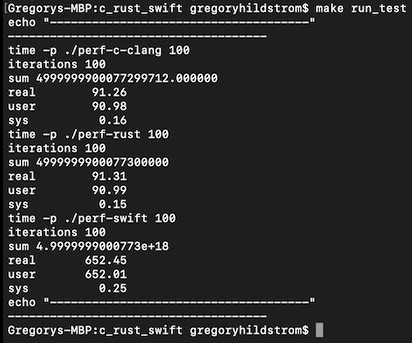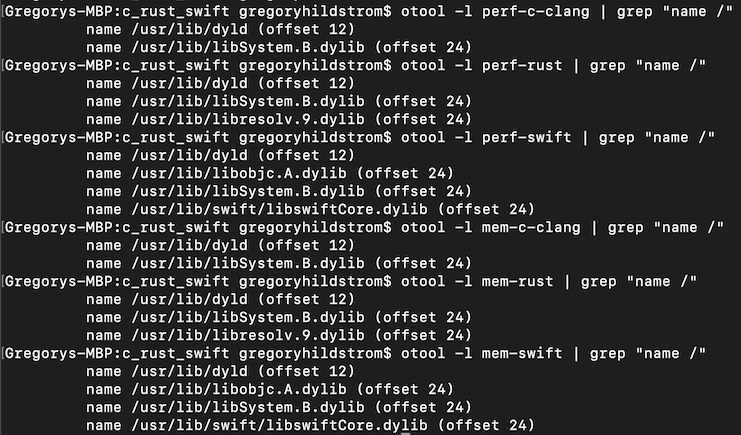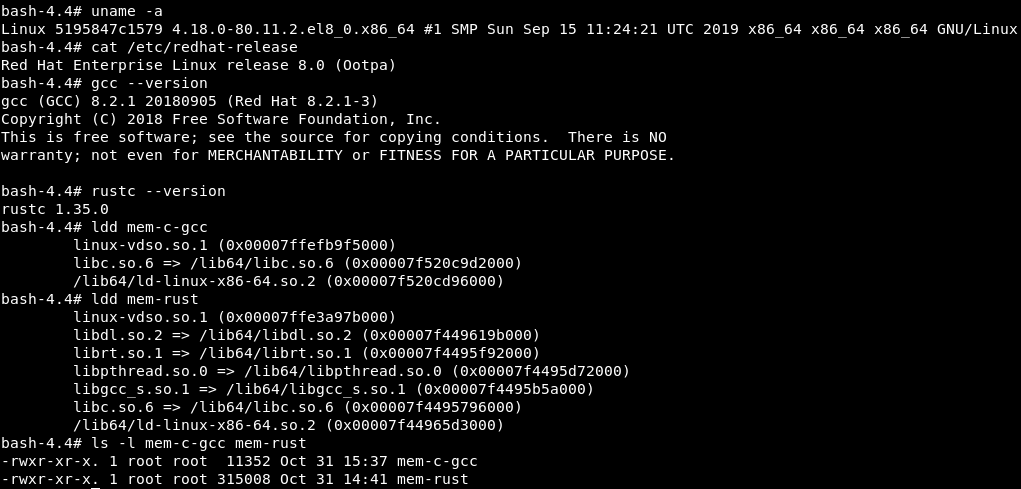
| perf.c | perf.rs | perf.swift |
#include < stdio.h >
#include < stdlib.h >
int main(int argc, char **argv) {
int element = 0;
int iteration = 0;
int iterations = 0;
int innerloop = 0;
double sum = 0.0;
int array_length = 100000000;
double *array = (double*)malloc(array_length * sizeof(double));
if (argc > 1)
iterations = atoi(argv[1]);
printf("iterations %d\n", iterations);
for (element = 0; element < array_length; element++)
array[element] = element;
for (iteration = 0; iteration < iterations; iteration++)
for (innerloop = 0; innerloop < 1000000000; innerloop++)
sum += array[(iteration + innerloop) % array_length];
printf("sum %f\n", sum);
free(array);
array = NULL;
return 0;
}
|
use std::env;
fn main() {
let iterations: usize;
let mut sum: f64 = 0.0;
let array_length: usize = 100000000;
let args: Vec< String > = env::args().collect();
let mut array: Vec< f64 > = vec![0.0; array_length];
iterations = (&args[1]).parse().expect("Not a number");
println!("iterations {}", iterations);
for element in 0..array_length {
array[element] = element as f64;
}
for iteration in 0..iterations {
for innerloop in 0..1000000000 {
sum += array[(iteration + innerloop) % array_length];
}
}
println!("sum {}", sum);
}
|
import Swift
var element = 0
var iteration = 0
var iterations = 0
var innerloop = 0
var sum = 0.0
let array_length = 100000000
var array: [Double] = Array(repeating: 0.0, count: array_length)
iterations = Int(CommandLine.arguments[1]) ?? 0
print("iterations \(iterations)")
for element in 0...array_length-1 {
array[element] = Double(element)
}
for iteration in 0...iterations-1 {
for innerloop in 0...1000000000-1 {
sum += array[(iteration + innerloop) % array_length]
}
}
print("sum \(sum)")
|






| mem.c | mem.rs | mem.swift |
#include < stdio.h >
#include < stdlib.h >
#include < unistd.h >
typedef struct {
int data1;
int data2;
} my_data_t;
void allocate(void)
{
my_data_t *my_data = NULL;
my_data_t **array = NULL;
int element = 0;
int list_size = 10000000;
double sum = 0.0;
for (element = 0; element < list_size; element++) {
my_data = (my_data_t*)malloc(sizeof(my_data_t));
my_data->data1 = element;
my_data->data2 = element;
array = (my_data_t**)realloc(array, sizeof(my_data_t*)*(element+1));
array[element] = my_data;
}
for (element = 0; element < list_size; element++) {
my_data = array[element];
sum += my_data->data1;
sum += my_data->data2;
free(my_data);
}
free(array);
#ifdef USE_TRIM
malloc_trim(0);
#endif
printf("sum %E\n", sum);
}
void waitsec(int sec)
{
int i;
for (i = 0; i < sec; i++)
sleep(1);
}
int main(int argc, char **argv)
{
waitsec(10);
allocate();
waitsec(600);
allocate();
allocate();
waitsec(600);
return 0;
}
|
use std::thread::sleep;
struct my_data_t {
data1: usize,
data2: usize,
}
fn allocate() {
let list_size: usize = 10000000;
let mut array: Vec< my_data_t > = Vec::new();
let mut sum: f64 = 0.0;
for element in 0..list_size {
let mut my_data = my_data_t {data1: 0, data2: 0};
my_data.data1 = element;
my_data.data2 = element;
array.push(my_data);
}
for element in 0..list_size {
let my_data = &array[element];
sum += my_data.data1 as f64;
sum += my_data.data2 as f64;
}
println!("sum {}", sum);
}
fn waitsec(sec: u32) {
for _ in 0..sec {
sleep(std::time::Duration::from_secs(1));
}
}
fn main() {
waitsec(10);
allocate();
waitsec(600);
allocate();
allocate();
waitsec(600);
}
|
import Swift
import Foundation
struct my_data_t {
var data1: Int = 0
var data2: Int = 0
}
func allocate() {
let list_size = 10000000
var array: [my_data_t] = Array()
var sum = 0.0
for element in 0...list_size-1 {
var my_data = my_data_t()
my_data.data1 = element
my_data.data2 = element
array.append(my_data)
}
for element in 0...list_size-1 {
let my_data = array[element]
sum += Double(my_data.data1)
sum += Double(my_data.data2)
}
print("sum \(sum)")
}
func waitsec(sec: Int) {
for _ in 0...sec-1 {
sleep(1);
}
}
waitsec(sec: 10)
allocate()
waitsec(sec: 600)
allocate()
allocate()
waitsec(sec: 600)
|

all: \ perf-c-clang \ perf-rust \ perf-swift \ mem-c-clang \ mem-rust \ mem-swift perf-c-clang: perf.c clang -O3 -o perf-c-clang perf.c perf-rust: perf.rs rustc -C opt-level=3 -o perf-rust perf.rs perf-swift: perf.swift swiftc -O -o perf-swift -emit-executable perf.swift mem-c-clang: mem.c clang -O3 -o mem-c-clang mem.c mem-rust: mem.rs rustc -C opt-level=3 -o mem-rust mem.rs mem-swift: mem.swift swiftc -O -o mem-swift -emit-executable mem.swift clean: rm -f *.o *.so rm -f perf-c-clang rm -f perf-rust rm -f perf-swift rm -f mem-c-clang rm -f mem-rust rm -f mem-swift run_perf_test: all echo "-------------------------------------" time -p ./perf-c-clang 100 time -p ./perf-rust 100 time -p ./perf-swift 100 echo "-------------------------------------" run_mem_test: all echo "-------------------------------------" ./capture.sh mem-c-clang & ./mem-c-clang ; sleep 2 ./capture.sh mem-rust & ./mem-rust ; sleep 2 ./capture.sh mem-swift & ./mem-swift ; sleep 2 echo "-------------------------------------"